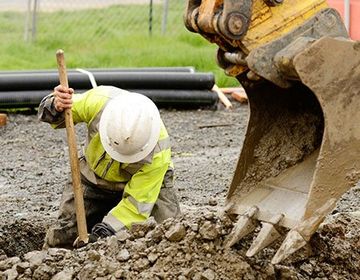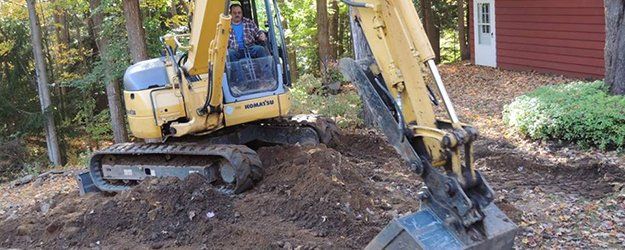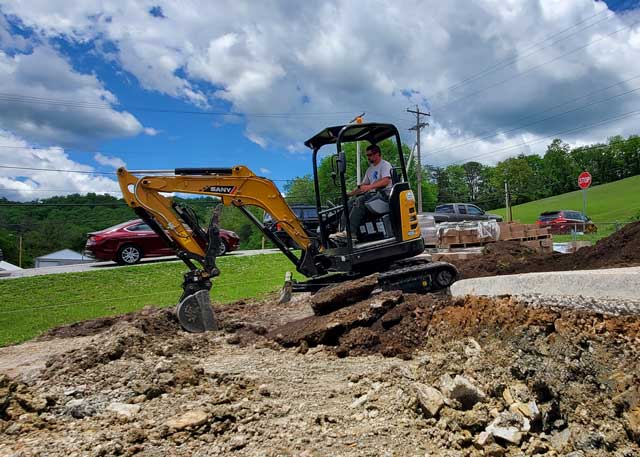Lancaster Trenching - Professional Trenching Solutions in Lancaster, Ohio
Lancaster Trenching - Professional Trenching Solutions in Lancaster, Ohio
Blog Article
Comprehensive Excavation Strategies: Grasping the Fundamentals for Success
In the realm of building and civil design, the importance of reliable excavation strategies can not be overemphasized. The careful preparation, specific execution, and careful interest to detail called for in excavation tasks require an extensive strategy that encompasses different fundamental elements. From first dirt analysis to the application of precaution and routine progression surveillance, grasping these core components is vital for attaining success in any kind of excavation endeavor. Nevertheless, truth mastery exists not just in comprehending these basics but in effortlessly integrating them to browse the intricacies of excavation jobs with finesse.
Understanding Excavation Task Preparation

Effective excavation tasks are constructed on the foundation of thorough and thorough preparation. The preliminary phase of any type of excavation job is the drawing board, where vital decisions are made that can significantly impact the end result of the job. Throughout this stage, it is vital to collect all pertinent details about the website, consisting of topographical surveys, dirt composition, and any kind of potential hazards that might exist. Recognizing the project spending plan, timeline, and range restrictions is essential for developing a comprehensive excavation strategy that makes certain the project's success.
One trick facet of excavation task preparation is the growth of a detailed timeline that details the series of tasks, turning points, and due dates. This timeline serves as a roadmap for the job team, allowing them to track progression and make essential adjustments to ensure the project remains on timetable. Furthermore, a well-defined budget that accounts for all expenditures, consisting of equipment service, labor expenses, and materials, is vital for preventing expense overruns and delays. By thoroughly considering all these factors throughout the preparation stage, excavation projects can be implemented successfully and properly, leading to effective results.
Soil Evaluation and Website Assessment
Conducting detailed soil evaluation and website evaluation is a critical action in the prep work phase of any type of excavation task. Dirt evaluation entails figuring out the composition, framework, and residential properties of the soil at the excavation site. This info is critical for understanding the soil's bearing capability, dampness web content, and capacity for disintegration, which are vital consider determining the excavation techniques and equipment required for the job.
Website evaluation exceeds soil analysis and incorporates a more comprehensive analysis of the total site conditions. This assessment includes identifying any prospective hazards, such as underground utilities, environmental concerns, or unpredictable surface, that can influence the excavation procedure. By thoroughly examining the website, task supervisors can establish efficient excavation approaches that focus on safety and security, performance, and ecological defense.
Making use of innovative modern technologies like ground-penetrating radar, soil tasting, and drone surveys can improve the accuracy and performance of dirt analysis and website assessment. Investing time and sources in these initial actions can inevitably save time and protect against expensive hold-ups or issues during the excavation procedure.
Tools Choice and Usage
Effective excavation projects count heavily on strategic tools option and use to ensure optimum performance and productivity. Picking the appropriate devices for the job is critical in maximizing efficiency and decreasing downtime. Aspects such as the kind of dirt, depth of excavation, and job scope play a substantial function in determining one of the most suitable devices for the job handy.

Along with Extra resources choosing the proper equipment, appropriate application is vital to task success. Operators has to be educated to handle the equipment securely and successfully - septic ohio. Routine upkeep checks and timely repairs help stop breakdowns and make certain regular performance throughout the task
Precaution and Laws Compliance
In the realm of excavation projects, focusing on safety actions and conformity with guidelines is more vital to ensuring a legitimately sound and secure operational setting. Security steps incorporate a series of techniques, consisting of conducting detailed website evaluations, applying correct signage and obstacles, and supplying sufficient safety training for all workers associated with the excavation process. Adherence to policies, such as OSHA requirements in the USA, makes certain that the excavation job fulfills the needed requirements to secure workers, spectators, and the surrounding atmosphere.

Tracking Progress and Adjusting Techniques
How can predict supervisors properly track the innovation of excavation jobs and adapt their strategies appropriately to optimize outcomes? Surveillance development is vital for ensuring that excavation projects remain on track and satisfy deadlines. Task supervisors can use various devices and techniques to track progress, such as day-to-day report card, normal site evaluations, and progressed tracking modern technologies like drones and general practitioners tracking systems. By continuously keeping track of the task's improvement, managers can recognize any type of potential delays or concerns early and take aggressive actions to address them.

Verdict
In final thought, understanding the principles of extensive excavation methods is crucial for the success of any type of job. By comprehending task planning, examining soil and site problems, selecting appropriate equipment, adhering to safety laws, and checking progression, task managers can guarantee a reliable and smooth excavation procedure. Carrying out these approaches will certainly bring about effective results and minimize prospective threats or obstacles throughout the excavation project.
The preliminary stage of any kind of excavation job is the planning phase, where essential choices are made that can considerably influence the end result of the job. Comprehending the job timeline, extent, and budget constraints is important for producing a detailed excavation strategy that makes certain the job's success.
Exactly how can forecast supervisors effectively track the advancement of excavation projects and adapt their approaches accordingly to optimize outcomes? By carefully keeping an eye on progress and being ready to adapt strategies, job supervisors can enhance the total success of excavation jobs.
By recognizing job preparation, analyzing soil and site problems, selecting proper devices, complying with safety and security guidelines, and keeping an eye on progress, project supervisors can ensure a effective and smooth excavation process.
Report this page